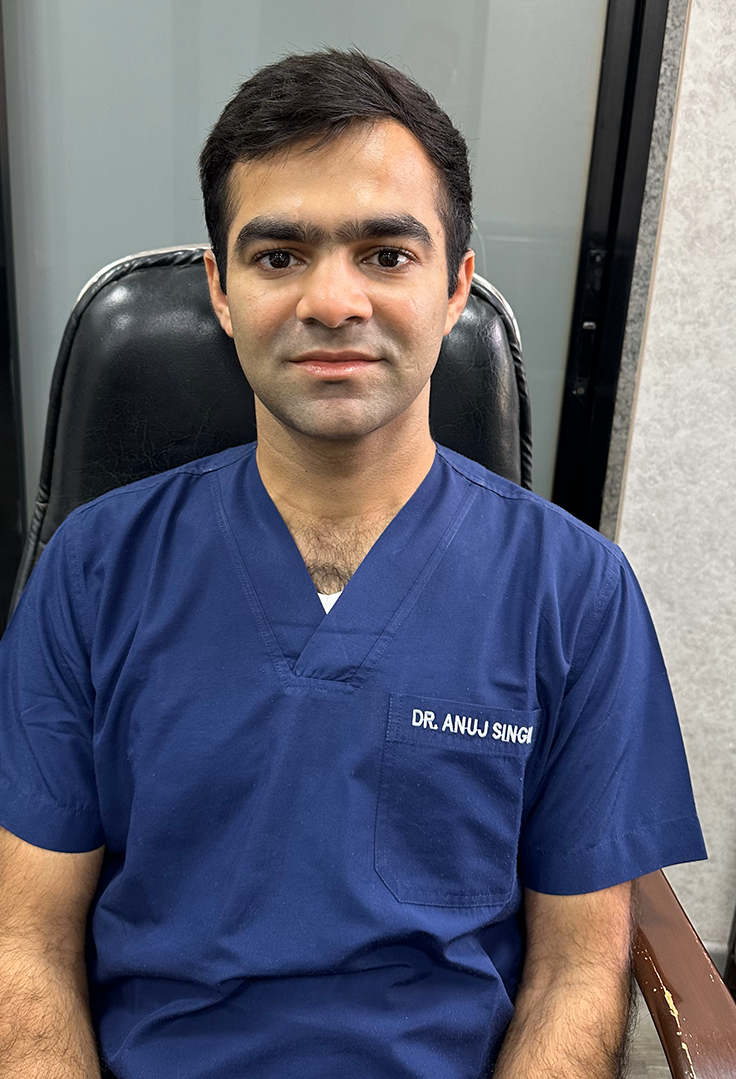What is Obesity?
How do I know if I am obese?
Obesity is a condition characterized by the excessive accumulation of fat in the body. It is commonly measured using the Body Mass Index (BMI), which calculates the relationship between weight and height. According to Indian guidelines, a person is considered obese if their BMI is above 25, while the World Health Organization (WHO) classifies obesity at a BMI above 30.
Obesity can have negative impacts on health and increase the risk of developing conditions such as heart disease, type 2 diabetes, and more. Reducing weight can significantly lower these risks. Dr. Anuj Naresh Singhi, recognized as the best bariatric surgeon in Mumbai, offers advanced treatments for obesity at Apollo Endoscopy, Laparoscopy & Robotic Obesity Centre, Mumbai .
What is “morbid obesity” or “clinically severe” obesity?
Morbid obesity, also called clinically severe obesity, refers to a BMI above 37.5 kg/m² without other health conditions or a BMI above 32.5 kg/m² with obesity-related conditions such as high blood pressure or diabetes.
Obesity Measurement: Body Mass Index (BMI)
BMI is a reliable indicator of body fat and is used to categorize weight classes such as underweight, normal weight, overweight, and obese. It is calculated by dividing weight (in kilograms) by the square of height (in meters).
Obesity Classification for Indians:
| Category | Indian BMI Values |
|---|---|
| Overweight | 23.0 - 24.9 kg/m² |
| Obesity | > 25 kg/m² |
| Morbidly Obese | > 32.5 kg/m² with comorbidity
> 37.5 kg/m² without comorbidity |
Various Weight-Loss Treatments Available
The goal of treating obesity is to reach and maintain a healthy weight. Based on your BMI, the following weight-loss options are available:
- Dietary changes
- Exercise and physical activity
- Behavioural changes
- Prescription weight-loss medications
- Weight-loss surgery
Discuss your options with Dr. Anuj Naresh Singhi, the best weight loss surgeon in Mumbai, to identify the right solution for you. At Apollo Endoscopy, Laparoscopy & Robotic Obesity Centre, Mumbai, you can receive personalized care to achieve your health goals.
Diseases Associated with Obesity
Obesity has been linked to numerous diseases, including:
- Type 2 diabetes mellitus
- Hypertension
- Dyslipidaemia
- Heart disease
- Cerebrovascular disease
- Respiratory disorders (e.g., obstructive sleep apnoea, asthma)
- Non-alcoholic fatty liver disease
- Osteoarthritis in weight-bearing joints
- Certain types of cancer
- Depression
- Infertility/PCOS/PCOD
What is Diabesity?
"Diabesity" is a medical condition characterized by the combination of obesity and type 2 diabetes. It results from metabolic imbalances ranging from mild blood sugar irregularities to full-blown diabetes. It is estimated that over 80% of type 2 diabetes cases are related to obesity.
India is facing a surge in diabesity, with over 100 million individuals expected to suffer from it in the next 20 years. Diabesity is also a major contributor to serious complications such as high blood pressure, heart attacks, strokes, kidney failure, and blindness. Additionally, diabesity is often linked with infertility, low sex drive, and fatigue.
Treatment:
Diabesity can be effectively treated through metabolic surgeries like Laparoscopic or Robotic gastric bypass, sleeve gastrectomy, and duodenal jejunal bypass. Dr. Anuj Naresh Singhi, the best obesity surgeon in Mumbai, specializes in these procedures at Apollo Endoscopy, Laparoscopy & Robotic Obesity Centre, Mumbai, where patients have achieved remarkable improvements, including the resolution of type 2 diabetes in 90% of cases following bariatric surgery.
Life After Surgery
- For long-term success, patients must make permanent lifestyle changes, including diet and activity modifications.
- Regular follow-ups with a Bariatric Nutritionist will help ensure healthy weight loss without nutritional deficiencies.
- Patients who previously ate to cope with stress or negative emotions are more successful if they learn alternative coping strategies, such as exercise or relaxation techniques.
- Most patients report an improved quality of life, enhanced body image, increased self-esteem, and greater energy levels after surgery.
Diet After Surgery
- Stage 1 (1-3 days post-surgery): Begin with a clear liquid diet, including rice kanji, coconut water, and clear soups.
- Stage 2 (4-15 days post-surgery): Transition to a high-protein liquid diet, including protein shakes, skimmed milk, and vegetable soups.
- Stage 3 (15-30 days post-surgery): Follow a mashed or pureed soft diet, such as oats porridge, mashed potatoes, khichdi, and custard made with skimmed milk.
- Stage 4: Follow a full diet as per your nutritionist’s guidance, while avoiding high-calorie and high-fat foods like sweets, ice cream, fried foods, and carbonated drinks.
General Instructions Post-Surgery
- Eat slowly and chew your food thoroughly, taking 15–20 minutes per meal.
- Drink enough fluids, aiming for 6–8 cups a day. Avoid gulping, carbonated, sugary, and alcoholic beverages.
- Stop eating once you feel satisfied to avoid nausea, vomiting, or stomach stretching.
- Avoid eating and drinking at the same time—wait at least 30 minutes after meals before drinking.
- Focus on consuming protein first during meals, followed by vegetables and whole grains.
- Engage in regular exercise, aiming for at least 30 minutes per day, to support weight loss.
Exercise After Surgery
- First 2 weeks post-surgery: Start with gentle walking and avoid lifting heavy objects or bending too much.
- 3 to 6 weeks post-surgery: Continue walking and incorporate aerobic exercises like cycling and swimming.
Benefits of Exercise:
- Reduces the risk of premature death
- Lowers the risk of heart disease, diabetes, and high blood pressure
- Strengthens bones, muscles, and joints
- Improves mental health, reducing anxiety and depression
- Helps with weight management

